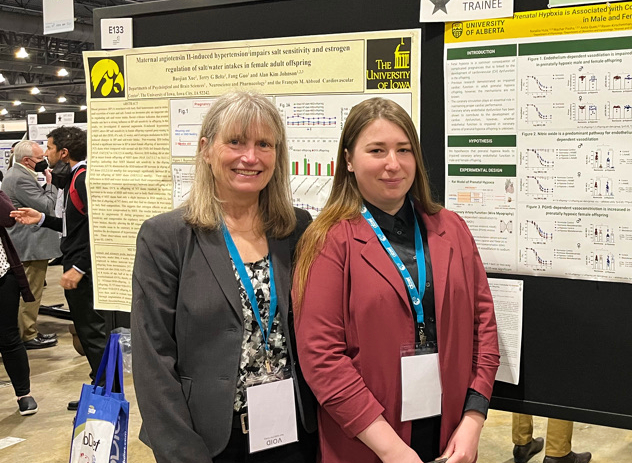Male and female offspring born from complicated pregnancies show profoundly different response to heart drug
Jon Pullin - 25 May 2022

Sandy Davidge and Nataliia Hula at an international research conference. Photo supplied.
A new U of A study indicates that the effect of hypoxia on a fetus has sex-specific implications for the treatment of cardiovascular disease later in life.
Fetal hypoxia occurs when the fetus (due to certain pathological conditions) is deprived of an adequate supply of oxygen in the womb.
“Our research has shown that being born from a complicated pregnancy where the fetus does not have an optimum oxygen supply leads to being susceptible to chronic cardiovascular disease later in life,” says lead investigator Sandy Davidge, who is a distinguished university professor in the departments of obstetrics and gynecology and physiology and the executive director of the Women and Children's Health Research Institute.
Cardiovascular diseases affect the heart and blood vessels and are the leading cause of death globally.
The Davidge laboratory’s most recent study, led by her PhD student, Nataliia Hula, shows that prenatal hypoxia affects the cardiac endothelin system differently in female and male adult offspring.
Davidge, Hula and their team looked at how fetal hypoxia affects the heart function later in life, with a focus on a factor called endothelin-1. While this molecule is essential for proper heart function under normal conditions, previous research shows that endothelin-1 plays a prominent role as a factor in pathological conditions. For this reason, endothelin-1 blockers have been used to improve patients’ cardiac health.
“Our data using a rat model of fetal hypoxia demonstrated that, as adults, inhibiting endothelin A receptors before a simulated heart attack improved cardiac recovery in females. However, it prevented cardiac recovery in males and resulted in fatal outcomes. This profoundly different effect on males and females was a surprise,” says Davidge.
The study results suggest that the sex of the patient as well as information about the mother's pregnancy should be taken into consideration when deciding how to treat patients in clinical conditions. It also shows the importance of sex-inclusive clinical trials.
“Many drugs and treatments have traditionally been tested in males only, to avoid factors that could complicate drug development and measuring the effectiveness of new drugs, like female hormones. We are starting to see more and more indications that sex is an essential biological variable when it comes to treatments and interventions, including medications,” says Davidge.
The next step in Davidge’s research will be to understand why the male offspring exposed to fetal hypoxia responded so differently to the endothelin-1 blockers. Long-term, her aim is to develop safe, sex-specific treatments that help prevent cardiovascular complications in adult offspring born from complicated pregnancies.
This study was funded by a Canadian Institute of Health Research Foundation Grant as well as the Stollery Children’s Hospital Foundation and the Alberta Women’s Health Foundation through the Women and Children’s Health Research Institute (WCHRI). Nataliia Hula was supported by a Stefan and Pelagia Wychowanec Graduate Scholarship and a Motyl Graduate Studentship in Cardiac Sciences from the University of Alberta.